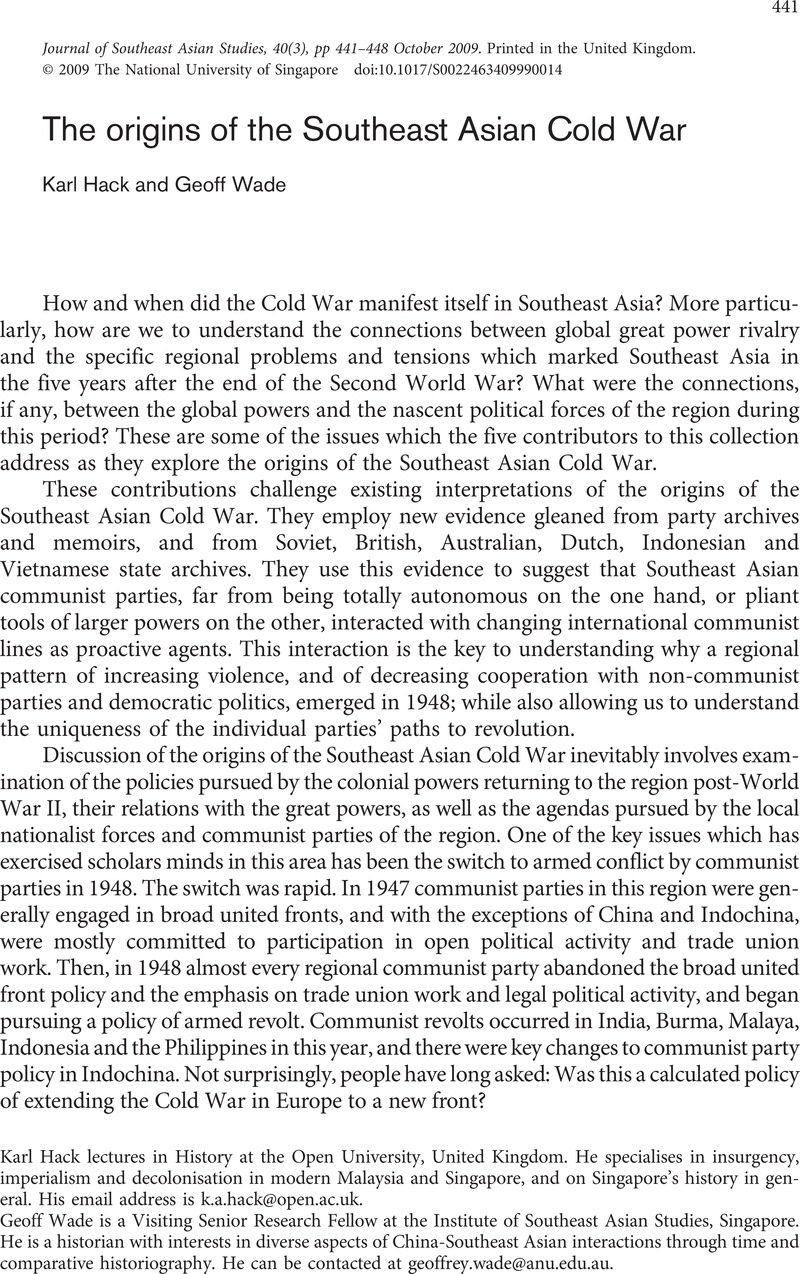Published online by Cambridge University Press: 01 September 2009

1 Brimmell, J.H., Communism in South East Asia; A political analysis (Oxford: Oxford University Press, 1959), pp. 255–63Google Scholar, concluded that the conferences prepared the stage for the coming revolts. Sacks, Milton, ‘Communism and regional integration’, in South Asia in the world today, ed. Talbot, Phillips (Chicago: University of Chicago Press, 1950), pp. 208–9Google Scholar, concluded Moscow's coordination was probable. See also, Marxism in Southeast Asia; A study of four countries, ed. Frank N. Trager (Stanford, CA: Stanford University Press, 1959), pp. 263–8. For a detailed empirical account which resists imposing patterns on events, see Tarling, Nicholas, Britain, Southeast Asia and the onset of the Cold War, 1945–1950 (Cambridge: Cambridge University Press, 1989)Google Scholar.
2 McVey, Ruth, The Calcutta Conference and the South-East Asia uprisings (Ithaca, New York: Cornell University, 1958)Google Scholar.
3 Ibid., p. 24.
4 See Deery, Philip, ‘Malaya, 1948: Britain's Asian Cold War’, Journal of Cold War Studies, 9, 1 (2007): 29–54CrossRefGoogle Scholar, and review of the same by Karl Hack, last accessed on 31 Oct. 2008 at http://www.h-net.org/~diplo/reviews/PDF/Hack-Deery.pdf. The parent URL for both pieces is: http://www.h-net.org/~diplo/reviews/jcws/jcws2007.html.
5 Stockwell, A.J., ‘A widespread and long-concocted plot to overthrow government in Malaya’, Journal of Imperial and Commonwealth History, 21, 3 (1993): 66–88CrossRefGoogle Scholar; Stockwell, Anthony, ‘Chin Peng and the struggle for Malaya’, Journal of the Royal Asiatic Society, 6, 1 (2006): 279–97CrossRefGoogle Scholar.
6 The theme of the ‘lost’ left, and of alternative liberal and civil society paths vitiated by the Cold War and the authoritarian approaches and legislation it encouraged, is, for instance, explored in Paths not taken: Political pluralism in post-war Singapore, ed. Michael Barr and Carl Trocki (Singapore: NUS Publishing, 2008).
7 Westad, Odd Arne, The Global Cold War: Third World interventions and the making of our times (Cambridge: Cambridge University Press, 2005)CrossRefGoogle Scholar. For Southeast Asia itself, an imminent publication is: Imperial retreat and the Cold War in South and Southeast Asia, 1945–1962, ed. Christopher Goscha and Christian Ostermann (Washington, DC: Woodrow Wilson Center; Stanford: Stanford University Press, forthcoming).
8 See Hack, Karl, Defence and decolonisation in Southeast Asia (Richmond: Curzon, 2001), pp. 56–71Google Scholar; and Remme, Tilman, Britain and regional cooperation in South-East Asia, 1945–49 (London: Routledge, 1995)Google Scholar. In 1949 Britain still favoured regional coordination – including participation by India – to bolster local nationalists, and increased French and Dutch concessions to these.
9 Ang Cheng Guan, ‘1948: The beginning of the cold War in Southeast Asia: The Vietnamese dimension’, paper at the Asian Research Institute (National University of Singapore) Roundtable on the Sixtieth Anniversary of 1948: ‘Reassessing the origins of the Cold War in Southeast Asia’, 10–11 July 2008, pp. 6–7. The pioneer work on regional communist links (with a focus on Thailand) was Goscha, Christopher, Thailand and the Southeast Asian networks of the Vietnamese revolution, 1885–1954 (Richmond: Curzon 1999)Google Scholar.
10 The Czech example was fresh in people's minds, and the themes of ‘New Democracy’ and a united front from below were far more satisfying than muddy compromises with bourgeois nationalists and increasingly frustrating negotiations with Dutch, British and French.
11 There is an additional unanswered question of when and how people perceived a ‘Cold War’ ‘from below’, as opposed to seeing primarily nationalism, anti-colonialism and so on. The debate has traditionally been framed very much ‘from above’, from the perspective of communist and Western policy-makers, rather than from the perspective of different groups.
12 Katherine McGregor, ‘The 1948 Madiun Affair: Reverberations for the Indonesian Communist Party’, paper read at the Asia Research Institute (National University of Singapore) Roundtable on the Sixtieth Anniversary of 1948: ‘Reassessing the Origins of the Cold War in Southeast Asia’, 10–11 July 2008.